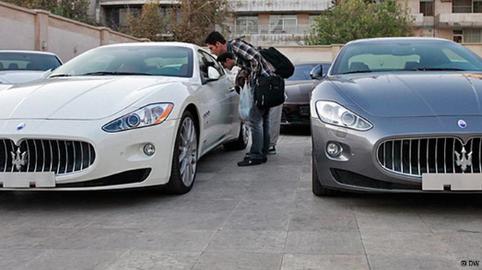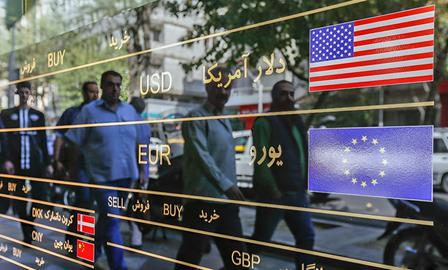
President Rouhani has ordered the vice president to prepare a report on individuals who have abused opportunities presented by sanctions. The decision acknowledges what only a handful of Iranian politicians accept: that there are some who have benefited so substantially as a result of sanctions that they will fight to ensure they continue.
Those who have travelled to Iran over the last few years would not have seen much evidence of how sanctions have affected the ordinary person on the street. There are billboards advertising the latest iPhone and iPad, Apple products that are banned from Iran through internationally imposed sanctions. Many have been surprised to see more Porsches on the streets of Tehran than in European cities. Shabnam, a 45-year-old physician, found it surreal: “I had to tell diabetic patients why our dialysis equipment did not work for lack of parts. Then I would bump into a Porsche on my way home.” She kept asking herself, “Why can they import Porsche despite sanctions and not medical supplies?” The paradox did not end there.
While most Iranians struggle to access medical supplies or to send small amounts of money to their loved ones in foreign countries, others have access to endless supplies of hard currency. Pouria, a 32-year-old businessman, has met several who have profited. “These were not people talking about hundreds of thousands in dollars or euros; they discussed millions and sometimes billions.” He recalled one night when he heard someone discussing the transfer of 100 million euros over the telephone. Pouria looked at the guy and thought, “I would not give him a penny if I saw him on the street.” Still, this man had made five million euros in less than 30 minutes. For people like this, sanctions have been a goldmine.
Stories like Pouria’s are not uncommon in Tehran; if anything, they are too common. Farzad, who runs a taxi service in Vanak district, has a brother who lives in New Jersey in the United States. “Some people approached me, asking if my brother cared to deposit one million US dollars in an account with Wells Fargo,” he said. They were businessmen importing machinery. “They would give us the checks and the money orders, just asking us to go to the bank,” he added. For the favour, they offered Farzad and his brother a 5% profit. The idea of making $50,000 for a single transaction was very tempting. Farzad missed sleep for a few nights then he decided to say no. “I did not want to put my brother in trouble,” he said.
Government officials now openly acknowledge that these kinds of deals take place. Presidential advisor Hesameddin Ashna told reporters in Tehran that “there are people who charge anywhere from 1 to 7 per cent to transfer funds between Iran’s accounts abroad and to bring these funds inside the country”. It has been a lucrative business, helping the government pay its bills and assisting the private sector in its import and export of commodities. And business has been good.
Hamed, an economic analyst working with several Iranian private banks, has seen it all. “I used to get surprised when people entered our currency exchange offices with cashier checks for 1 million euros or 5 million euros asking to change them.” But these days, he is used to it. “They constitute an important market segment,” he admits. Those involved come from all walks of life: ordinary people, technicians, businessmen, street-smart hustlers and officers from the Islamic Revolutionary Guard. When Hamed asked one person how he came upon such a hefty sum, the customer simply said, “I did a service.” The problem is that most of these individuals will not make similar revenues under ordinary circumstances. Hamed believes “when the sanctions are lifted these guys’ golden goose will die.” So they do everything they can to keep it alive.
But Iranians are not alone in benefiting from the sanctions. In 2012, in an interview with Mehranameh magazine, the chairman of Iran-China Chamber of Commerce Asadollah Asgarouladi predicted that “China and people benefiting from our trade with China will not be happy to see our trade with the West come back to the pre-sanctions level”. In his opinion, “the economic interests are not to be ignored, there will be resistance”. To many observers, it seems that while sanctions were hurting ordinary Iranians, they were a unique opportunity for some Iranians and many foreigners to make money. These beneficiaries’ resistance to any change to the current status quo does not help Rouhani’s administration in its efforts to reach out to the West and the United States.
President Rouhani’s new edict reveals how significant these special interests have become. An advisor close to the new cabinet, who asked to remain anonymous, told Iranwire, “The interests generated by sanctions are motivating some groups to sabotage any rapprochement.” While the majority of Iranians celebrated the Geneva Accord last November, these groups mourned the agreement. “We all expected some remorse from these individuals, but I think we underestimated the extent of the problem,” he said. “They were making billions off sanctions; they are not going to kiss that goodbye”.
The Iranian government is realising now that its ability to make and enforce policy has been severely compromised. The official hopes that the president will be able to “get a hold of the situation; otherwise he will lose all his credibility to make any deal with foreign powers”.
“The situation is not what many think,” Hamed says, somberly. “The sanctions and the previous administration’s mismanagement have ruined the fabric of decision making in our society.” Still, it seems Hassan Rouhani is determined to find a way out. He does not have any other choice.
visit the accountability section
In this section of Iran Wire, you can contact the officials and launch your campaign for various problems





















comments